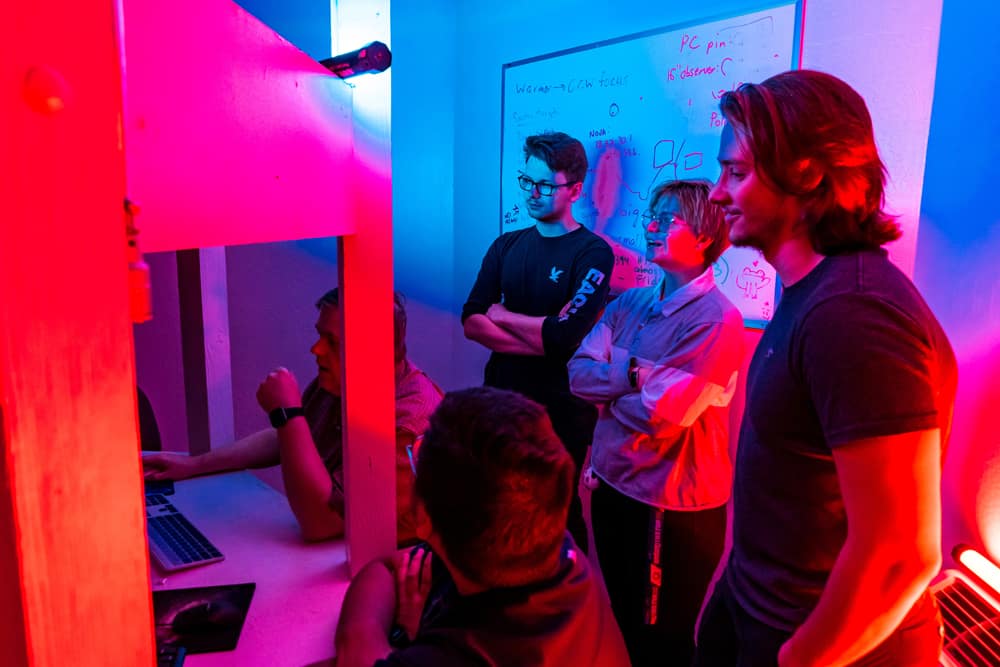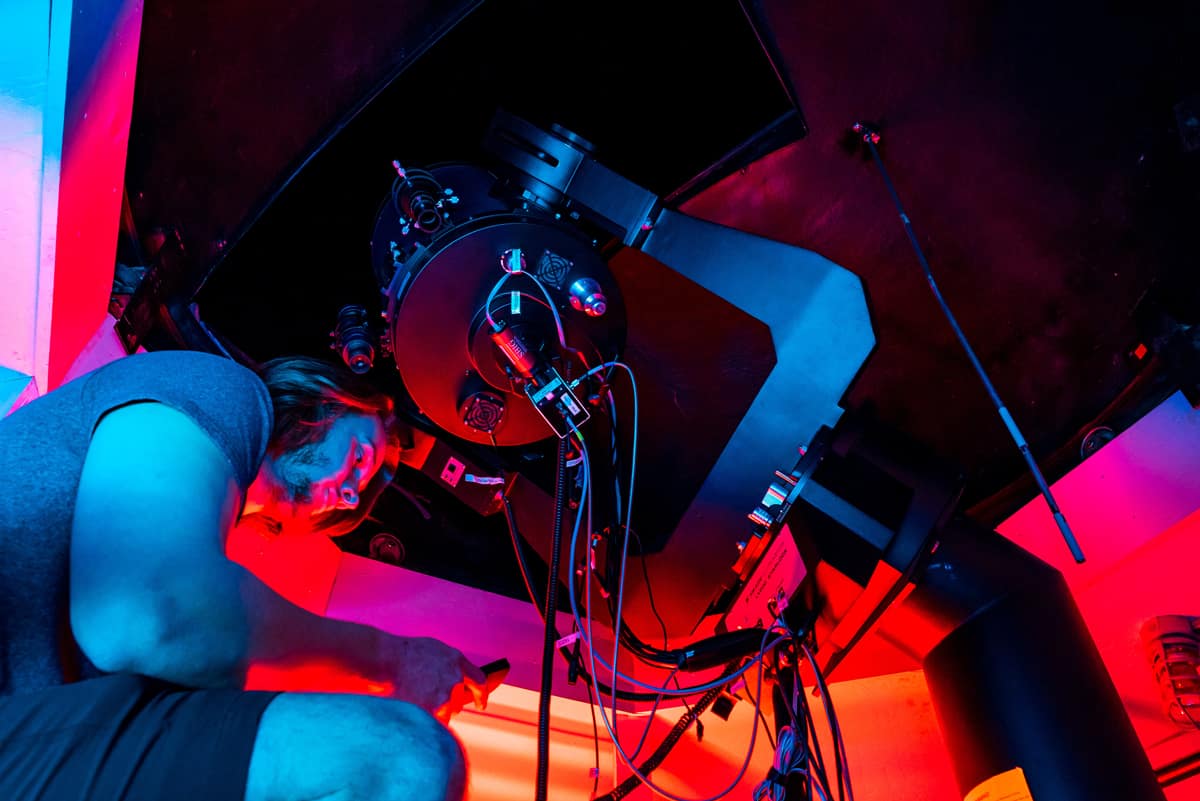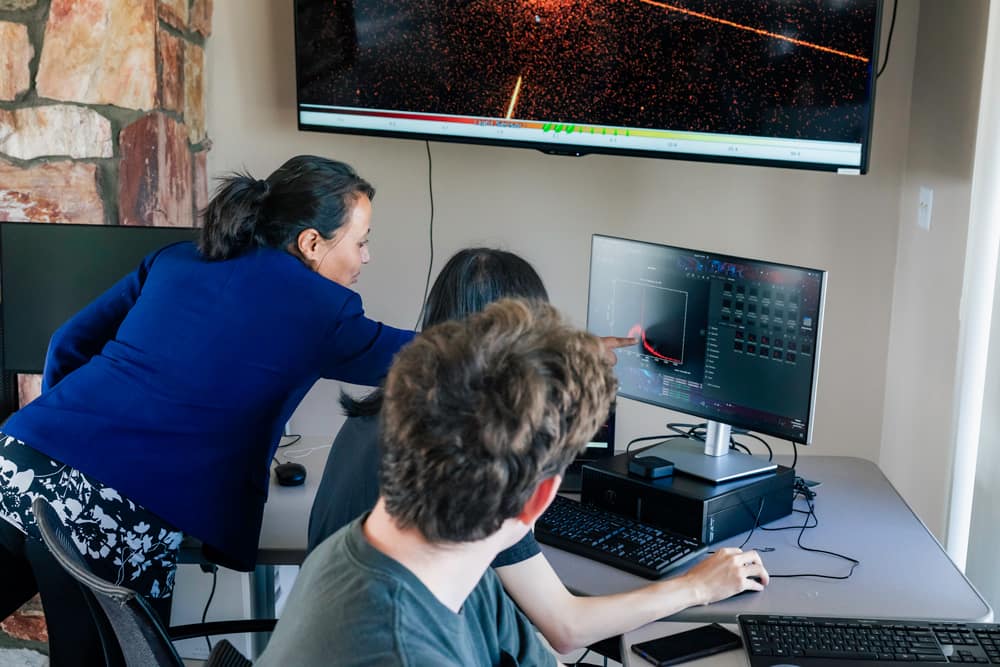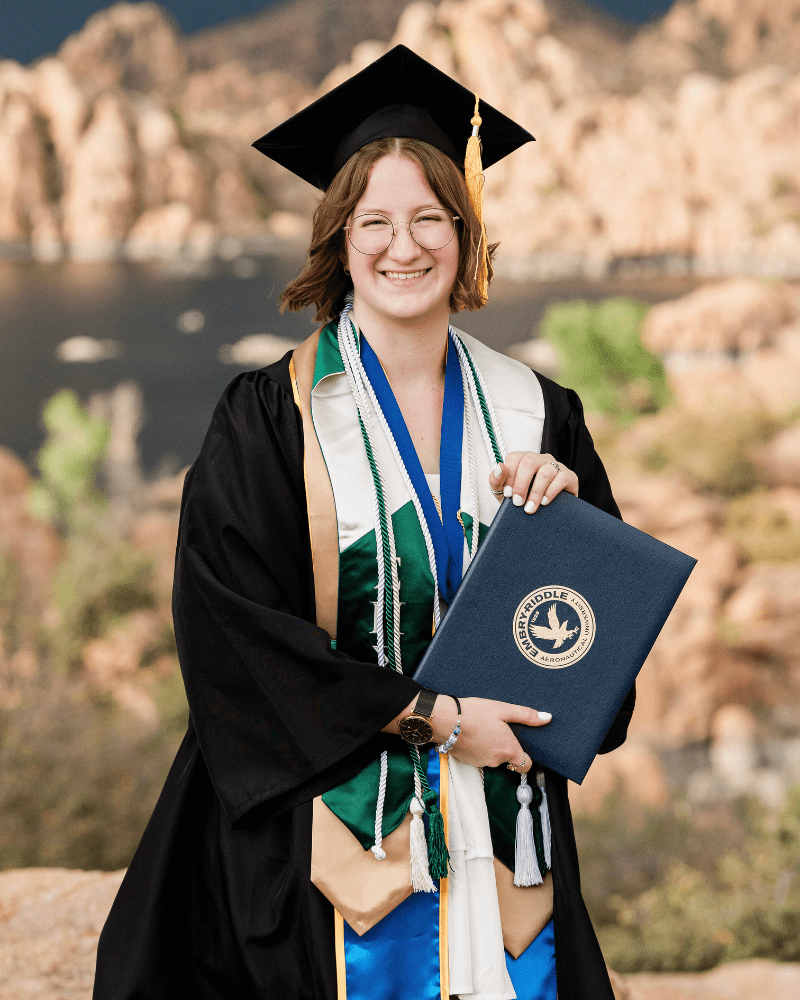

What is Astronomy — and What Can You Do with an Astronomy Degree?

What do white dwarfs, the Fried Egg Galaxy and Cow flares have in common?
They’re all part of astronomy — the science of exploring the great unknown beyond Earth.
If you’re fascinated by outer space, how cosmic systems form, evolve and interact, a degree in Astronomy could be your launchpad to a rewarding career. At Embry-Riddle Aeronautical University’s Prescott Campus, the B.S. in Astronomy blends physics and astronomy, offering students research experience, faculty mentorship and access to some of the most advanced telescopes in the region.
What is Astronomy?
Astronomy is the study of planets, stars, galaxies and the forces of nature that shape them. Astronomers use ground-based telescopes, space-based observatories like the Hubble and James Webb Space Telescopes and advanced instruments that measure radio, infrared, gamma and X-ray emissions — all parts of the electromagnetic spectrum that can’t be seen by the human eye.
Some astronomers explore black holes, neutron stars or dark matter. Others keep an eye on near-Earth space objects, analyze the lifecycle of stars or investigate the potential habitability of exoplanets — planets that orbit stars beyond the solar system.
At its core, astronomy combines curiosity with science to answer humankind’s oldest question: What’s out there?
What Can You Do with an Astronomy Degree?
A degree in astronomy opens the door to numerous professional pathways. Some graduates apply their skills in data analysis, engineering or education, while others pursue advanced degrees to contribute to breakthrough research. Either way, astronomy careers all blend problem solving with discovery.
With an astronomy degree, you may:
- Research galactic formation, stellar evolution and planetary systems.
- Calculate orbits and model how celestial bodies behave.
- Collect and analyze astronomical data to develop new theories.
- Develop software and instruments for observation and data analysis.
- Engage the public through outreach and education.
- Present findings at scientific conferences and publish in journals.
These skills prepare you for a wide range of astronomy jobs, whether in government, academia or industry.


Fields of Astronomy
The fields of astronomy each with their own tools, themes of exploration and star-studded questions:
- Astrobiology: Explore one of science’s most intriguing questions — the existence of life beyond Earth — in a field that integrates geology, biology and chemistry to plant life on other planets or moons.
- Astrometry: Map the universe with rigorous precision, tracking the positions, motions and distances of celestial bodies to chart the dynamic architecture of the cosmos.
- Astrophysics: Decode the universe through the laws of physics, revealing the nature of stars, galaxies, black holes and the space-time continuum itself — and the forces that control them all.
- Observational Astronomy: Harness the power of telescopes to capture real-time data across the electromagnetic spectrum, unveiling distant galaxies, supernovae, pulsars and other celestial phenomena.
- Theoretical Astronomy: Simulate the universe with advanced mathematics and computer models, constructing predictions that explain mysteries beyond the reach of observation.
Together, these fields hint at the depth and diversity of astronomy careers, offering a specialization to match your curiosity.
What Will I Learn at Embry-Riddle?
At the Prescott Campus, you’ll move beyond textbooks into hands-on discovery. Students work in the Prescott Observatory Complex, using 20-inch and 16-inch optical telescopes, and collaborate on projects funded through internal initiatives, like the Undergraduate Research Institute, or by NASA, the National Science Foundation and other leading organizations.
Our faculty analyze data from the James Webb Space Telescope, unlocking the secrets of cosmic dust, and the X-Ray Imaging and Spectroscopy Mission (XRISM), learning how the universe looks “through X-ray eyes”. And the campus observatory at our Daytona Beach Campus houses the largest university-based research telescope in Florida.
As an undergraduate, you’ll have opportunities to contribute to research on rare stars, colliding-wind binaries and other boundary-expanding topics. Not many students, and especially undergraduates, are given opportunities like these.
Beyond the classroom, you’ll gain real-world experience at nearby facilities like Lowell Observatory in Flagstaff, reinforcing your education through applied learning. Involvement in clubs and student organizations enhance the academic journey.

Where Can an Astronomy Degree Take You?
Wondering where you can work with an astronomy degree? According to the U.S. Bureau of Labor Statistics, most astronomers find careers in:
- Scientific research and development (37%)
- Government agencies such as NASA, the Department of Energy and the Department of Defense (29%)
- Colleges and universities (24%)
- Independent or consulting roles (5%)
Careers with an Undergraduate Degree
With a bachelor’s degree in astronomy, graduates can step into roles such as:
- Data analyst
- Observatory technician
- Planetary data curator
- Research assistant
- Science writer
Careers with a Graduate Degree
For those pursuing a master’s or Ph.D., doors open to becoming a:
- Observatory staff astronomer
- Research scientist
- Principal investigator on space missions
- Theoretical astrophysicist
- University professor or lecturer
Career Outcomes
Graduates of the program have gone on to work diverse astronomy jobs at institutions such as NASA, the Naval Sea Systems Command, MIT-Haystack Observatory and the Harvard-Smithsonian Astrophysical Observatory.
With the projected job growth of 4% between 2024–2034 and an average median wage of $132,170, according to U.S. Bureau of Labor Statistics, the career outlook for astronomers looks as bright as the stars they study!

Student Success Spotlight
Casciotti combined her astronomy degree with minors in Computer Science and Mathematics, strengthening her skills in research and analysis. During her time at Embry-Riddle, she presented findings on colliding-wind binaries at the Flagstaff Astronomy Symposium.
As she transitions into graduate school, Casciotti reflects on the value of mentorship at Embry-Riddle:
“My mentors inspire me. They are both amazing people who make great contributions to their field while also putting in so much time and effort into their students. I aspire to support my own students one day in the same way they have supported me throughout my academic career.”
Casciotti plans to pursue a Ph.D. in Physics and Astronomy, continuing her path toward leadership in research and education.
Why Choose Embry-Riddle Prescott?
Imagine turning your passion for the stars into your profession. Here’s why students choose Embry-Riddle Prescott for their astronomy degree:
- Early Research Access: As a smaller campus, undergraduates work alongside faculty researchers sooner than at larger universities.
- World-Class Facilities: From the Particle Physics Lab to the Observatory Complex, students gain experience using advanced equipment rarely available at the undergraduate level.
- Prime Location: Prescott’s mile-high elevation and low light pollution create ideal stargazing conditions.
- Connected Faculty: Professors collaborate with NASA, NSF and global observatories, offering students unique networking opportunities.
- Recognized Excellence: The Prescott Campus consistently ranks among the Top 10 Regional Colleges – West by “U.S. News & World Report.”
At Embry-Riddle, your classroom stretches across galaxies. You won’t just study the universe — you’ll help uncover its mysteries.
Constellations of Your Future
Whether you’re drawn to the physics of black holes, the search for extraterrestrial life or the beauty of galaxies far beyond our own, Embry-Riddle prepares you to reach higher in our B.S. in Astronomy at the Prescott Campus and B.S. in Astronomy and Astrophysics at the Daytona Beach Campus.
Launch your career past the stratosphere. Request more information or apply and begin your journey among the stars.
Insights
 Worldwide College of Aviation Associate Professor Dr. Linda Vee Weiland shares insights and knowledge on the air traffic industry.
Worldwide College of Aviation Associate Professor Dr. Linda Vee Weiland shares insights and knowledge on the air traffic industry.
How to Become an Air Traffic Controller Explore human factors psychology, a field that blends psychology, engineering and design to improve safety, efficiency and user experience.
Explore human factors psychology, a field that blends psychology, engineering and design to improve safety, efficiency and user experience.
What is Human Factors Psychology Learn how to become an aerospace engineer at Embry-Riddle Aeronautical University. Discover diverse careers, hands-on experiences and specializations in the aerospace industry.
Learn how to become an aerospace engineer at Embry-Riddle Aeronautical University. Discover diverse careers, hands-on experiences and specializations in the aerospace industry.
How to Become an Aerospace Engineer




